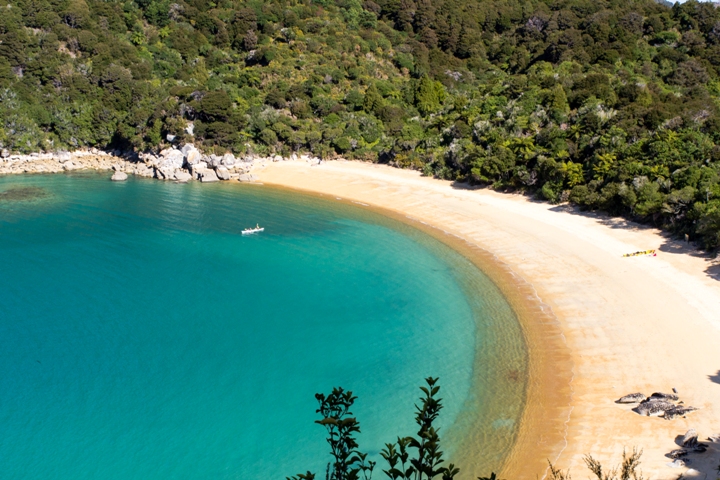Abel Tasman becomes first certified Zero Carbon tourism operator
Brendan Alborn is the Commercial Director for the family-owned group which consists of AquaTaxi, Marahau Water Taxis, Marahau Sea Kayaks, Marahau Beach Camp, Hooked Restaurant and the Abel Tasman Centre.

- Country:
- New Zealand
AbelTasman.com is announcing today that they have become the first certified Zero Carbon tourism operator in the Abel Tasman after being awarded this status by not-for-profit enterprise Ekos.
Brendan Alborn is the Commercial Director for the family-owned group which consists of AquaTaxi, Marahau Water Taxis, Marahau Sea Kayaks, Marahau Beach Camp, Hooked Restaurant and the Abel Tasman Centre. He said the family is proud of their latest achievement “sustainability has always been a focus for us and over the past few years, we’ve invested heavily in our efforts to reduce the carbon footprint of our businesses.”
To get certified by Ekos a business must measure its emissions, develop a plan to reduce them and purchase carbon credits to offset any remaining emissions through an accredited ETS offset scheme. Brendan Alborn said, “after measuring our carbon emissions and developing a pathway to continually reduce our footprint whilst still growing our business and contributing to the local economy, we’ve now offset the remainder of our emissions via the Uruwhenua Regenerative Forest project in Golden Bay.”
The Uruwhenua Forest project in Golden Bay consists of 93 hectares of regenerating native forest adjacent to Kahurangi National Park in Upper Takaka, Golden Bay. The land was pasture 25 years ago. The native regrowth has been protected by a QEII covenant and the project is registered in the New Zealand Emissions Trading Scheme.
“We know that our local community and customers are very concerned about the impacts of climate change and we felt we had a moral obligation to do our part in reducing and offsetting our emissions. That’s why we’re really proud to now call all of our business 100% certified Zero Carbon business operations” Brendan said.
The Abel Tasman visitor industry already makes a significant contribution to local conservation projects and the restoration of the Abel Tasman, Brendan noted. “But we wanted to step up when it comes to climate change and do everything we can to measure, reduce and offset emissions created through our commercial activities. We wanted to be able to offer our visitors the peace of mind that they can enjoy the Abel Tasman without a carbon footprint.”
Whilst the business has been working on carbon reduction for several years now, aided by Brendan’s overseas experience in energy efficiency, it was only recently they began measuring their entire carbon footprint from freight through to fuel consumption and then offset that with local provider Ekos. “We chose to offset via Ekos because we align with their philosophy of creating carbon offsets not only to absorb carbon from the atmosphere to fight climate change but to ensure that all these projects also contribute to restoring local biodiversity and creating healthy waterways.”
Brendan said he was encouraged by the progress they’ve made in their reduction efforts already “in the past year alone, we have reduced our emissions by over 10% just by working on fuel efficiency initiatives such as digital fuel gauges and more frequent servicing.” The company has also invested in a state of the art wastewater treatment system, onsite waste management, and a new energy-efficient kayaking and water taxi base. He added that the company has a new sustainability plan which includes a commitment to further reducing their emissions and that they were exploring the technology available to tackle their biggest carbon contributor - fuel for their water taxi fleet.
The tourism industry is New Zealand’s biggest export earner and makes up nearly 1 in 7 jobs in New Zealand. It’s critical to our region's local economy and employment. “But tourism also has a large carbon footprint and whilst we can’t control all of that, we do have to make an effort to tidy our own backyard and know that we’re doing our part in the global fight against climate change,” said Brendan.
Brendan called on other tourism industry businesses to step up and join them so they can “work together to promote Nelson Tasman as a destination for the sustainably-minded visitor”.
Nelson Regional Development Agency (NRDA) CEO Mark Rawson echoed Alborn's call to action stating "Nelson Tasman already has an extraordinary visitor offering that hinges on our stunning natural landscapes. It just makes sense to continue the good work the industry has done in the conservation space and step up our game in terms of carbon footprint". He added that the community's desire to see businesses taking leadership on climate change had been heard loud and clear during the recent Te Tauihu Intergenerational Strategy series.
ALSO READ
Bitter Cold Snaps Signal Climate Change in North America
Green Pledge Turns Into Mass Movement to Combat Climate Change
Stuart Calman Appointed New Zealand’s Climate Change Ambassador
The Melting Heart of Greenland: Climate Change's Impact on Culture and Environment
Tamil Nadu at forefront of climate governance through TN Climate Change Mission: TN Finance Minister.










